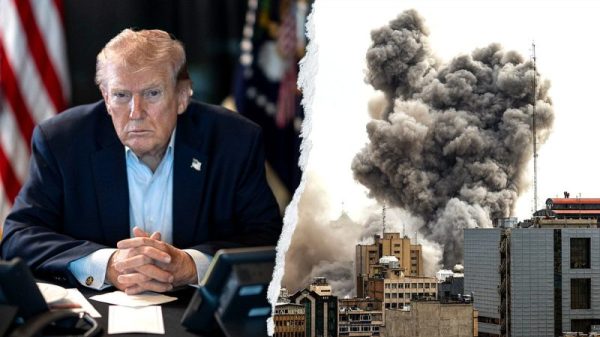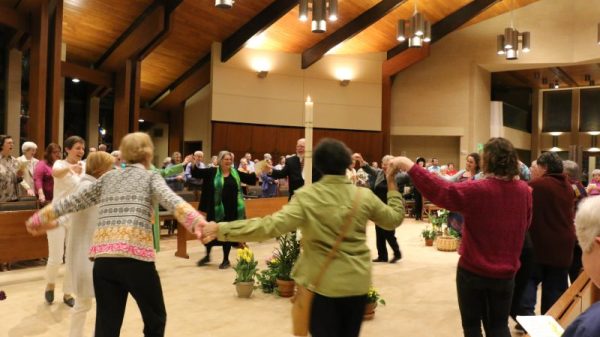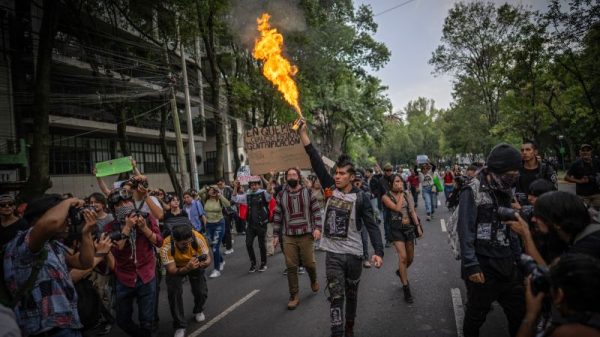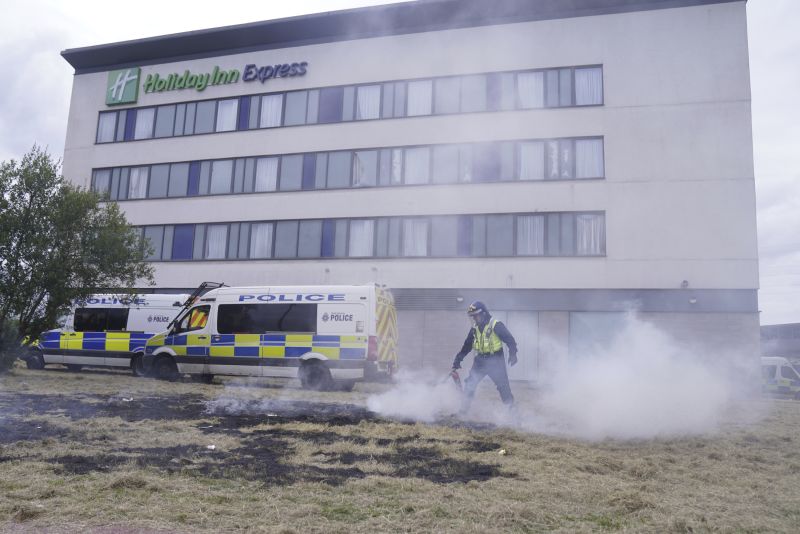Like many nondescript hotels in provincial cities around the UK, the Holiday Inn Express in Rotherham has been used for years by the British government to house asylum seekers trapped in administrative limbo. There have been hostile protests here before. But none, residents say, like the spasm of hatred on Sunday when rioters set fire to the building as more than 200 people cowered inside.
“I lived through the (2011) London riots when I was a kid,” said a man who saw Sunday’s violence unfold from his living room. “I don’t even think they were this bad. We saw them trying to kill people yesterday,” said the resident – who, like many, wished to remain anonymous amid the fear stoked by the violence.
The Rotherham riot was one of more than a dozen protests that followed a stabbing attack that left three children dead in the northern English town of Southport a week ago. In the torrent of misinformation that flowed from the tragedy, outrage boiled over into racist violence.
The turmoil represents the first major challenge for Keir Starmer, Britain’s new prime minister, who now faces a summer of rumbling discontent.
In his former role of England’s chief prosecutor, Starmer presided over Britain’s last major wave of riots in London and elsewhere 13 years ago, allowing courts to sit for 24 hours and for judges to hand down longer, tougher sentences. Now, Starmer has fewer resources at his disposal: pared-back policing, gummed-up courts, a shortage of jail cells and more polarized politics.
The day after the unrest, the hotel is a ruin. The ground is strewn with broken glass and burnt-out bins. Some kids ride past on bikes out of curiosity: “Nowt happens here. We wanted to see what’s going on,” says one youngster. Differences of opinion swiftly become visible. Some locals chant from their windows as they drive by: “Get ’em out.” Others are more sympathetic. A mother drives past, points at the building and says to her children: “They came here to be safe, not to be tortured like that.”
The Rotherham riot was planned for days but has its roots in discontent that has fomented for much longer. For years, politicians have made increasingly strident promises to curb migration to the UK; for the most part, those promises have fallen short. Fringe voices have stepped into the breach, stoking fear over “out of control” immigration and amplifying fears that migrants are the source of all the problems experienced by Britons who struggle with rising living costs, poor housing conditions and a lack of skilled jobs.
Asylum seekers first came to the hotel in 2021, after the chaotic US military withdrawal from Afghanistan. Its rooms have since filled with refugees from all over the world. All were evacuated after Sunday’s violence, with reports that some were forced to sleep in the nearby woods after they fled in fear.
Ninzr said he had lived in the Rotherham hotel since he arrived, but was at another processing center when the riot broke out. He was planning to return to the hotel, but got a text from his friend inside. “They say to me, you go back now. My friend a video sent for me. Big problem. Fire,” he said in broken English. He collected his bag before heading back to another processing center in Birmingham.
‘I’ve never felt more scared’
Britain’s asylum system is in a mess. Ninzr is one of almost 100,000 people waiting for their claim for asylum to be processed. The cost of housing them has also ballooned. In a speech last month, the new finance minister Rachel Reeves claimed the previous government had overspent on the asylum system by more than £6.4 billion ($8.12 billion).
In Rotherham, a notorious grooming scandal casts a long shadow. Hundreds of girls were abused by gangs of south Asian men over decades, and when the exploitation was finally exposed, authorities were accused of failing to deal with it, in part, over fears they would be accused of racism. Eventually the gangs were busted, many of the perpetrators jailed, and systems were overhauled. But lingering suspicions mean that concerns about immigration often bubble to the surface.
But residents in the nearby estate all said residents had caused no major problems, other than “a bit of litter.”
“There’s all these claims on Facebook that they rape women,” said the man who lived through the London riots. “My wife walks our dogs late at night. No issues. They never cause any issues. They’ve come from war-torn countries, they’ve got nothing to do. They play football in the car park. They got excited last year when it snowed. They’d never seen snow before in their lives.
“These people – they’re not animals, they’re not savages, they’re not doing these things to people, they’re just people that are trying to get a better life.”
Another woman, walking her dog through the hotel parking lot, said she’d never had problems from the hotel residents.
“I’ve never felt more scared to live on the estate than I did yesterday – and that was from our own people. So I’d rather take 100 of them living in there, than I would people who did what they did yesterday, living next door to them,” said the woman, who also declined to give her name.
She said her brother-in-law, a police officer responding to the riot, was injured after someone threw a rock at his arm. “He didn’t leave straight away, so he was there for hours with a suspected broken arm trying to hold them off.” He spent the night in hospital and was diagnosed with a broken elbow.
Others, though, condemned the riots but were frustrated that the sentiments behind them had been allowed to foment. A man standing outside his house, which looks onto the hotel, remembered when the first Afghan families arrived in 2021.
“The community couldn’t do enough for them. They were amazing people. No trouble whatsoever. Then they just put whoever they wanted here,” he said.
He said he felt unfairly branded as “far right” for expressing a desire for the government to “fix” its asylum system. “In the 1970s, I was fighting against the National Front… so if I’m far right, go on, tell me,” he said.
A shrunken state
“Some of them were 14-year-old boys just chucking sticks at police. It was just like an opportunity to be mischievous,” said one 17-year-old, Elliott Nuttall, who saw the violence spread to his nearby village.
On Monday, he had been planning to meet up with a friend, an Indian boy whose family moved to the UK when he was five years old. “His mum said to him, ‘No, you’re not allowed to go out,’ because it’s obviously not a good time for it.”
“Knowing there was going to be a protest a good three or four days prior, knowing what was going on nationally, I can’t believe how underpoliced they were.”
Videos from Sunday show an initially light police presence as hundreds of far-right rioters hurled stones at the hotel’s windows, pushed a burning garbage bin into a broken doorway, and stormed the building.
Responding to the wave of violence will be a challenge for Britain’s shrunken state. Starmer has pledged that “far-right thugs” will feel the “full force of the law,” but that force has been sapped by years of slashed budgets as successive Conservative governments imposed “austerity” on public services in the UK in the fallout from the 2007-2008 financial crisis.
In a YouGov poll published late last year, fewer than half of people thought police were “doing a good job,” down from 77% four years earlier. Police numbers were cut drastically under the previous Conservative government, although had recently begun to be restored.
Britain’s court backlog has also swelled, particularly since the Covid-19 pandemic, making sentencing the convicted rioters more difficult. Jail space is also a problem: The new Labour government recently announced plans to release some prisoners early to free up space for new convicts.
Hundreds of people have been arrested following the riots, and on Tuesday a court in Sheffield, convicted the first of those arrested in relation to the violence at Rotherham, PA Media reported.
With more demonstrations planned for this week, do the residents near the Rotherham hotel fear more violence? “After seeing our community come out today, no,” said the man who lived through the London riots. “This community came out in numbers and looked after ourselves.”
“After seeing our community come out today, no,” said the man who lived through the London riots. “This community came out in numbers and looked after ourselves.”

































